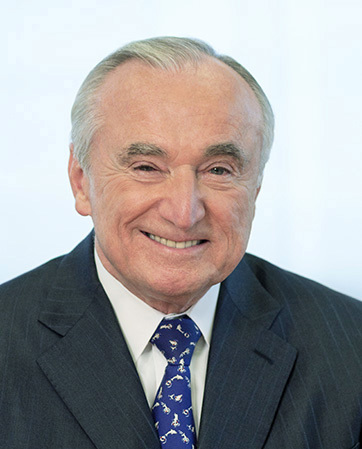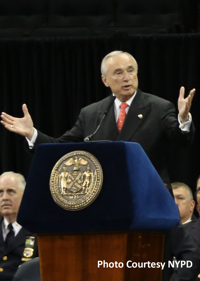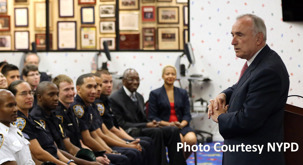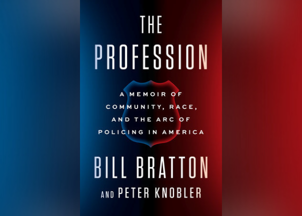Speakers By Topic

Speakers By Type

 Type
Type


"{{ovation.quote}}"
-{{ovation.company}}Collaborate or Perish
No one today is better known around the world for their ability to get citizens, governments, and industries working together to increase productivity and improve the safety of cities than BILL BRATTON. Today, companies and managers face unique challenges and opportunities in reaching out to others, given the incredibly connected world in which we live. In this presentation, Bratton provides practical strategies anyone can use, from the cubicle to the boardroom. This is the ultimate guide to getting things done in today’s networked world.
Transform Crisis into Opportunity
As the only person to have led the police force in America’s two largest cities, New York and Los Angeles, Commissioner BILL BRATTON has seen and handled his fair share of crises. His internationally-heralded tactics and track record serve as a strategic playbook on how to excel even in the most challenging of circumstances. In this talk, Bratton shares his wide range of experience and invaluable insights into how to engineer a team destined for success, and how to be a transformative, predictive leader that can both anticipate issues before they happen and turn any unforeseen crisis into an opportunity.
Leadership and Policing America in the 21st Century
Now, more than ever, when the role of police in society is under a microscope like never before, BILL BRATTON’s authority on the subjects of leadership and improving law enforcement are profoundly useful. Bratton presents the vision for the future of American policing that we sorely need as we face the many challenges for public safety to include the issues of race relations, restoring trust, crime, disorder, cybercrime, terrorism and the criminal justice reform movement. Additional challenges include homelessness, the emotionally disturbed and the growing drug addiction problem. It’s a positive vision, shaped by reality.

Commissioner Bratton inspired Malcolm Gladwell’s “The Tipping Point”
Malcolm Gladwell’s iconic bestseller, The Tipping Point. What’s less known is the book was inspired by the precipitous drop in New York City’s crime rate under COMMISSIONER WILLIAM J. BRATTON's leadership as Chief Commissioner of the NYPD. As Gladwell notes in the article, in one precinct of East New York there were 126 homicides in 1993. By 1995, just one year after Commissioner Bratton took his post, that number had dropped to 44. Commissioner Bratton’s leadership strategies-- from increasing coordination between NYPD departments to his development of CompStat, a computer-based command and accountability system-- were behind the dramatic turnaround. As Gladwell wrote, “There is probably no other place in the country where violent crime has declines so far, so fast. Once the symbol of urban violence, NYC is in the midst unprecedented transformation.”
Watch Commissioner William J. Bratton speak at the American Justice Summit >>

Arguably the most effective, visionary police leader of modern times, Commissioner William J. Bratton's books outline his transformative leadership style
Propelled by extraordinary results, COMMISSIONER WILLIAM J. BRATTON had a remarkable career, becoming the most famous and accomplished law enforcement leader of modern times. In every city in which he served, Commissioner Bratton slashed crime rates and professionalized policing while also addressing the racial tensions that are always present in American policing profession.
Turnaround: How America’s Top Cop Reversed the Crime Epidemic dives into Commissioner Bratton’s first time with the NYPD, sharing how he delivered on his promise to “fight crime in every borough…and win.”
Bratton’s second book, Collaborate or Perish!: Reaching Across Boundaries in a Networked World, serves as a “field-tested playbook” on how to successfully collaborate, which Commissioner Bratton argues is a crucial to survival in today’s highly inter-connected world. Using Bratton’s own successes in getting citizens, government and industries to work together, as well as the work of co-author and Harvard fellow Zachary Tumin, Collaborate or Perish! offers leadership strategies that are easy to implement in any industry.
The Profession is the retrospective of his esteemed career in full, and he shares the same stories in his gripping talks. A riveting combination of cop stories and community involvement, The Profession presents not only a fascinating and colorful life at the heights of law enforcement leadership but a vision for the future of American policing that we sorely need.
Watch Commissioner William J. Bratton at SALT Talks >>
Watch Commissioner William J. Bratton on CBS Sunday Morning >>
William J. Bratton is one of the world’s most respected and trusted experts on risk and security issues. During a 46-year career in law enforcement, he instituted progressive change while leading six police departments, including seven years as Chief of the Los Angeles Police Department and two nonconsecutive terms as the Police Commissioner of the City of New York. He is the only person ever to lead the police agencies of America’s two largest cities. Now as Executive Chairman of Teneo Risk, Commissioner Bratton advises clients on risk identification, prevention, and response.
Prior to assuming his role at Teneo Risk, Commissioner Bratton was the 42nd police commissioner of the City of New York from January 2014 to September 2016. It was the second time he had held the post. During that time he oversaw 32 months of declining crime, including historic lows for murders and robberies. At the same time, he implemented an unprecedented Neighborhood Policing program to close the gap between the NYPD and some of the communities it serves. Neighborhood Policing refocused resources on the underlying issues in individual neighborhoods, connected cops with community partners, enhanced outreach and communication strategies, and was a cornerstone of “precision policing”—the practice of targeting the few who create crime and disorder while safeguarding the many. Commissioner Bratton also spearheaded the first major technological overhaul in the NYPD in years, the Mobile Digital Initiative, which gave a smartphone with custom-designed apps to every officer and put a tablet in every patrol car. These devices put an entire precinct’s data capabilities in the palm of an officer’s hand, allowing him to read details about calls for help, research locations of interest, search names and license plates, and complete paperwork—all while remaining in the field. Additionally, the ever-changing threat picture in the world’s number one target for terrorism mandated major reforms to the NYPD’s already robust counterterrorism capabilities. In response, Commissioner Bratton developed two new units—the Critical Response Command (CRC) and the Strategic Response Group (SRG)—which now provide the city with more than 1,000 highly trained and properly equipped officers who are dedicated to counterterrorism, large-scale mobilizations, site security, and rapid deployment citywide.
A U.S. Army veteran of the Vietnam War, Commissioner Bratton began his career in 1970 as a beat cop in the Boston Police Department. In 1976 he was awarded the department’s highest citation for valor—The Schroeder Brothers Memorial Medal—for facing down a bank robber and rescuing a hostage. By 1980 he had risen to Superintendent of Police, the BPD’s highest sworn position.
In the 1990s, Commissioner Bratton established an international reputation for re-engineering police departments and fighting crime. As Chief of the New York City Transit Police, Boston Police Commissioner, and in his first term as New York City Police Commissioner, he revitalized morale and cut crime in all three posts, achieving the largest crime declines in New York City’s history. At the NYPD in 1994 and 1995, he led the development of CompStat, the internationally acclaimed command accountability system now in use by police departments nationwide. CompStat employs accurate, real-time intelligence, rapid deployment of resources, relentless follow-up, and accountability systems to focus the work of police on stopping crimes before they happen. As Los Angeles Police Chief from 2002 to 2009, in a city known for its entrenched gang culture and youth violence, he brought crime to historically low levels, greatly improved race relations, and reached out to young people with a range of innovative police programs. While at the LAPD he also led the creation of its Real Time and Predictive Policing initiatives.
Commissioner Bratton also served as Chief Executive Officer of the Bratton Group LLC from 2012 through 2013. The Bratton Group provided a wide range of consulting, leadership, management, and public-safety services to public- and private-sector clients in the United States and abroad. The group specialized in community-based crime-reduction efforts, community partnerships, maximization of technology and software, anti-corruption and anti-terrorism strategies, creative training, leadership development, enhanced investigation techniques, and organizational realignment.
A noted author, commentator, and consultant, Police Commissioner Bratton holds a Bachelor’s degree from Boston State College (now the University of Massachusetts Boston) and is a graduate of the FBI National Executive Institute. At Harvard University’s Kennedy School of Government, he was a Senior Executive Fellow in Criminal Justice and a member of the school’s National Executive Session on Policing. He has twice served as President of the Police Executive Research Forum (PERF) and in 2009 served as President of the Major Cities Chiefs Association.
The recipient of many honors throughout his career, Mr. Bratton was named by Security magazine as one of 2010’s most influential people in the security industry based on his leadership qualities and the positive impact that his work has made on organizations, colleagues, and the general public. This was the second time in two years that he has appeared on the magazine’s list of most influential security executives. In 2007 he received Governing Magazine’s “Public Official of the Year award.” In January 1996 he appeared on the cover of Time Magazine and was featured in the article “Finally, We’re Winning the War Against Crime.” And in 2009, for his collaborative efforts in working with U.S. and British police forces, he was recognized by Her Majesty Queen Elizabeth II with the honorary title Commander of the Most Excellent Order of the British Empire (CBE).
His critically acclaimed autobiography Turnaround, with Peter Knobler, was published by Random House in 1998. In 2021 he published The Profession, a memoir of community, race, and and the arc of policing in America. In 2012, Mr. Bratton and Zachary Tumin, a senior researcher at Harvard’s John F. Kennedy School of Government, co-authored a management leadership book, Collaborate or Perish!, where they lay out a field-tested playbook for collaborating across the boundaries of our networked world.